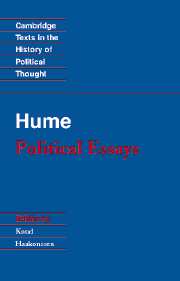Book contents
- Frontmatter
- Contents
- Acknowledgements
- Introduction
- Chronology
- Bibliographical notes
- A note on the text and the edition
- Biographical notes
- Bibliography
- Political Essays
- 1 Of the liberty of the press
- 2 That politics may be reduced to a science
- 3 Of the first principles of government
- 4 Of the origin of government
- 5 Of the independency of Parliament
- 6 Whether the British government inclines more to absolute monarchy, or to a republic
- 7 Of parties in general
- 8 Of the parties of Great Britain
- 9 Of superstition and enthusiasm
- 10 Of civil liberty
- 11 Of the rise and progress of the arts and sciences
- 12 Of national characters
- 13 Of commerce
- 14 Of refinement in the arts
- 15 Of money
- 16 Of interest
- 17 Of the balance of trade
- 18 Of the jealousy of trade
- 19 Of the balance of power
- 20 Of taxes
- 21 Of public credit
- 22 Of some remarkable customs
- 23 Of the original contract
- 24 Of passive obedience
- 25 Of the coalition of parties
- 26 Of the Protestant succession
- 27 Idea of a perfect commonwealth
- Appendix: Excerpts from Hume's History of England
- Notes
- Index
- Title in the Series
24 - Of passive obedience
Published online by Cambridge University Press: 05 June 2012
- Frontmatter
- Contents
- Acknowledgements
- Introduction
- Chronology
- Bibliographical notes
- A note on the text and the edition
- Biographical notes
- Bibliography
- Political Essays
- 1 Of the liberty of the press
- 2 That politics may be reduced to a science
- 3 Of the first principles of government
- 4 Of the origin of government
- 5 Of the independency of Parliament
- 6 Whether the British government inclines more to absolute monarchy, or to a republic
- 7 Of parties in general
- 8 Of the parties of Great Britain
- 9 Of superstition and enthusiasm
- 10 Of civil liberty
- 11 Of the rise and progress of the arts and sciences
- 12 Of national characters
- 13 Of commerce
- 14 Of refinement in the arts
- 15 Of money
- 16 Of interest
- 17 Of the balance of trade
- 18 Of the jealousy of trade
- 19 Of the balance of power
- 20 Of taxes
- 21 Of public credit
- 22 Of some remarkable customs
- 23 Of the original contract
- 24 Of passive obedience
- 25 Of the coalition of parties
- 26 Of the Protestant succession
- 27 Idea of a perfect commonwealth
- Appendix: Excerpts from Hume's History of England
- Notes
- Index
- Title in the Series
Summary
In the former essay, we endeavoured to refute the speculative systems of politics advanced in this nation; as well the religious system of the one party, as the philosophical of the other. We come now to examine the practical consequences, deduced by each party, with regard to the measures of submission due to sovereigns.
As the obligation to justice is founded entirely on the interests of society, which require mutual abstinence from property, in order to preserve peace among mankind; it is evident, that, when the execution of justice would be attended with very pernicious consequences, that virtue must be suspended, and give place to public utility, in such extraordinary and such pressing emergencies. The maxim, fiat Justitia & ruat Coelum, let justice be performed, though the universe be destroyed, is apparently false, and by sacrificing the end to the means, shews a preposterous idea of the subordination of duties. What governor of a town makes any scruple of burning the suburbs, when they facilitate the approaches of the enemy? Or what general abstains from plundering a neutral country, when the necessities of war require it, and he cannot otherwise maintain his army? The case is the same with the duty of allegiance; and common sense teaches us, that, as government binds us to obedience only on account of its tendency to public utility, that duty must always, in extraordinary cases, when public ruin would evidently attend obedience, yield to the primary and original obligation.
- Type
- Chapter
- Information
- Hume: Political Essays , pp. 202 - 205Publisher: Cambridge University PressPrint publication year: 1994
- 1
- Cited by



